Restaurant ERP: Choose the Best Software for Your Business
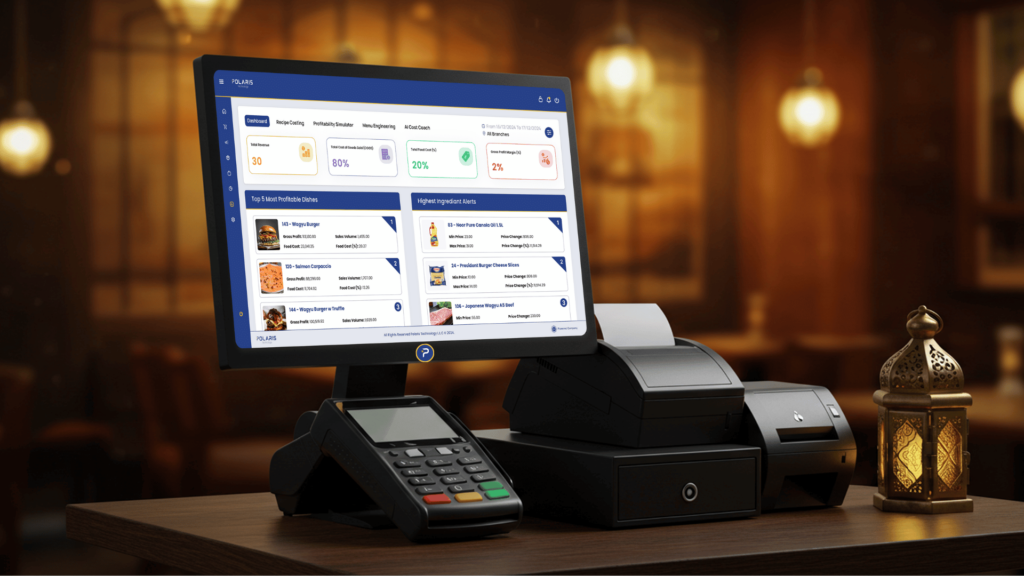
Selecting the best restaurant ERP software involves a thorough assessment of your specific operational needs. By aligning the ERP with your unique operational demands, you can optimize restaurant profitability, reduce costs between 10-30%, enhance efficiency, and achieve sustained success. Read until the end, where we provide the solution to how to choose the best restaurant ERP software.
What is a Restaurant ERP Software?
Restaurant Enterprise Resource Planning (ERP) is a software designed to manage a broad range of operations specific to the restaurant industry. Unlike a restaurant point of sales (POS) system, which focuses simply on recording the sales and may be suitable for smaller establishments, a restaurant ERP system offers a comprehensive solution for managing all restaurant operations and are better suited for larger, more complex businesses with advanced needs. Its applications extend to the wider food and beverage (F&B) space, including cafes, pubs and bars, fast-food delis, catering businesses, or cloud kitchens.
An ERP for restaurants provides multiple features serving various areas of the business, such as menu engineering, restaurant inventory management, restaurant accounting software, recipe and cost control management, human resources and employee scheduling, supplier management, real-time reporting, and other important aspects that we will cover in this article.
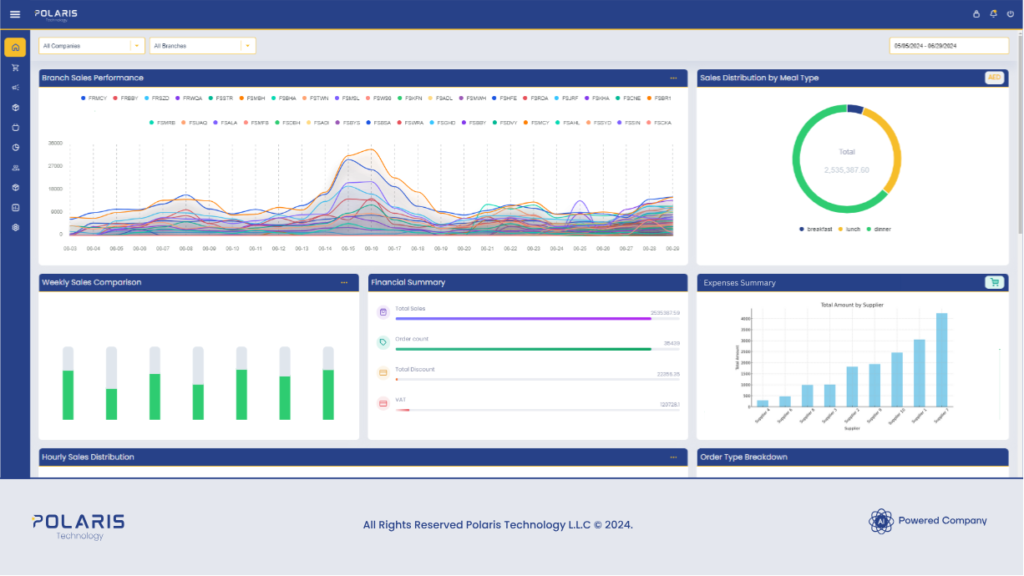
Top Benefits of Restaurant ERP Software
Let’s explore the benefits of restaurant ERP software for restaurant owners and managers. These benefits are interconnected, boosting operational efficiency, increasing profitability, and optimizing costs.
Restaurant ERP for Increased Operational Efficiency
Standardize Data and Align Processes
With ERP software, restaurant owners and managers can establish standardized data formats and definitions across all departments, and branches, in case of multi-location F&B businesses. This includes standardizing recipes, pricing, accounting software, supplier information, and employee data.
With a deep understanding of the different processes within the restaurant, the ERP system can organize the workflow, communication, and collaboration within and between departments, aligning processes. Not only this boosts efficiency, but also helps in saving costs.
Automate Work to Save Time
The automation power embedded in a restaurant ERP software removes reliance on time-consuming manual inputs. Besides improved time management when handling restaurant operations, automation is also beneficial for restaurant managers because it helps optimize resources through staff scheduling, inventory management, and waste management. Automated processes reduce the risk of human errors and ensure consistency in operations and processes. The benefit of automation through restaurant ERP is that it enhances efficiency, reduces errors, saves time and costs, and contributes to an improved customer experience. This is a vital component for the success and sustainability of modern restaurant operations.
Achieve Financial Compliance with the Best Accounting Software for Restaurants
When using restaurant ERP software, all systems connected: sales, accounting, inventory, purchase, kitchen, human resources, etc. This leads to having streamlined processes and visibility over all the data and numbers from all across these systems. With instant visibility on sales ledger, revenue, profit and loss insights, cost of goods sold, and other critical numbers, F&B professionals using an ERP software have the best accounting software for restaurants at their fingertips. Knowing their numbers (revenue, expenses, profits, cashflow), allows them to make fast decisions and grow their restaurant business faster than those businesses not using an ERP system.
Restaurant ERP for Cost Savings
Restaurant ERP software has the capability to streamline purchase processes, automate inventory management, and leverage real-time data insights to minimize wastage and identify cost-saving opportunities. Additionally, when integrated with financial modules, an ERP for restaurants will enhance budget control and ensure efficient resource allocation.
When the point of sales (POS) system is connected with the inventory, as it’s the case with restaurant ERP, restaurant managers and owners can accurately predict demand, so that they will order the right amount of ingredients. This reduces the waste up to 20%.
Restaurant ERP can also help to identify employee theft, responsible for 7% of annual revenue, and prevent them. Using Polaris ERP, Qasab Turkish Cuisine increased their security on the front-of-the house by 80%.
Restaurant ERP for Increased profitability
The ultimate goal of any restaurant owner is to boost business profitability. Restaurant ERP software allows real-time data analysis and reporting, indicating crucial insights, such as:
- The days of the week, month, and year are most profitable and least profitable
- The most popular and profitable dishes
- Menu items that are most often ordered in combinations
And so much more. These sorts of insights can help managers design special offers or adjust the menu offerings through what is known as menu engineering, optimizing resources to boost profitability.
Restaurant ERP for Real-Time Decision Making
Here’s one question for restaurant managers and owners: How long does it take you to understand the health of your F&B business?
This means having access to all key insights like profit & loss, cashflow, food cost, employee performance, waste, and so on. By the time we get all these data manually standardized and analyzed, the business is moving on, and these data is no longer up to date.
AI-powered restaurant ERP does all these time-consuming activities in seconds, in the form of questions and answers. Your advantage is that you will get your personal, instant AI business advisor to streamline your business any time, anywhere. With this tool at your fingertips you can make informed decisions about restaurant operations such as:
- Optimizing staff schedule to reduce costs
- Changing suppliers to negotiate better deals
- Investing in new systems or equipment
- Expanding your business when the time is right, and much more.
Must-Have Features of Restaurant ERP to fit F&B Businesses
As a restaurant owner or manager, the main thing you need to concern yourself with is how to simplify your business. When thinking about switching to an ERP as your restaurant management system, you need to make sure it is customized to your business, your needs, and that it has the potential to make your life easier. Here are some things you need to ask yourself when choosing an ERP for your restaurant business:
Does it meet your needs?
For instance, does the restaurant software serve multiple locations, or does it allow employee scheduling and communication? Does the software answer your needs for real-time analytics to assist you in fast decision-makings? Or does it allow integration with third-party delivery services like Deliveroo or Talabat? Really think about all your restaurant management needs and evaluate which ERP really answers all your needs.
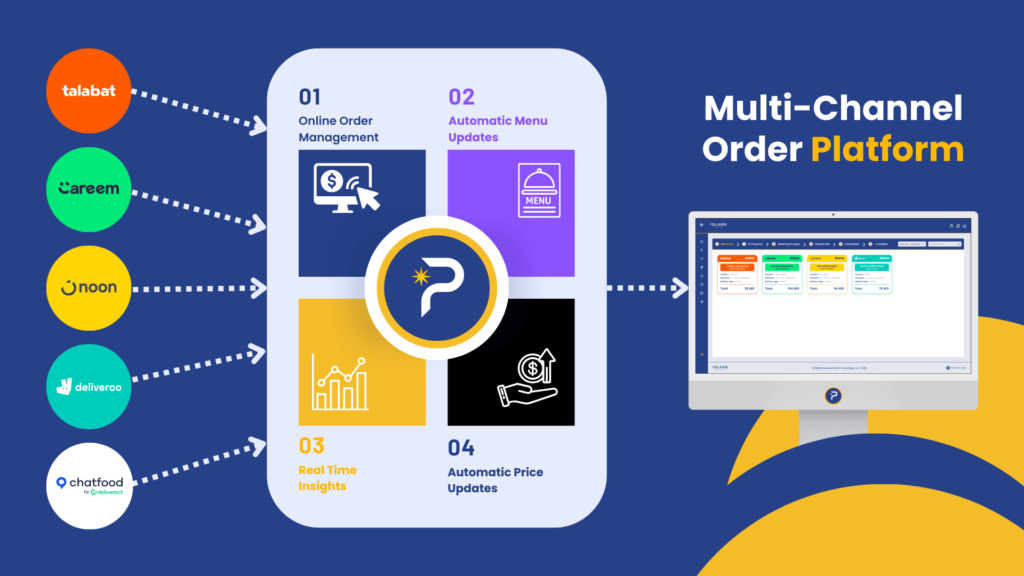
Does it have the ability to automate routine tasks?
Order processing, inventory management, or payroll are just some of the tasks that require a lot of attention and manual input. An ERP, equipped with a unified platform, will have the capability to automate processes, reducing the time spent on manual inputting, helping you focus on what matters the most, which is delivering excellent service.
Does it have the potential to streamline your business?
Your goal as a restaurant manager or owner is to have happy customers, excellent reviews, and a great occupancy rate. It can be challenging to balance excellent customer service when you are experiencing downtime and slow system performance, or you are at risk of vulnerability in front of house operations. A restaurant management ERP software that comes with a unified platform assures seamless operations and swift service, safeguarding against unauthorized transactions. This allows you the possibility to unlock real-time insights to make informed decisions to improve your restaurant’s performance.
Can it make life easier for you?
Ultimately it comes down to this: Can an ERP software relieve you of the ongoing stress of keeping up with inventory management, menu engineering, employee management, financing accounting, and so many other aspects of your business? If yes, we urge you not to think twice. Delegate many of these time-consuming tasks to intelligent software so that you can focus on delivering 5-Star services to your customers.
What features should you consider when looking for the best ERP for restaurant management?
Ability to manage and update menus efficiently, including pricing, ingredient tracking, and customization options, including combo solutions. This solution translates into increasing menu items’ profitability, based on analyzing their performances across specific periods of time. Polaris ERP’s AI-powered menu engineering not only tells F&B professionals which items in their menu are the most profitable and popular, but also gives data-driven recommendations on how to improve the overall menu profitability.
Accurate inventory management capabilities, tracking stock levels, and automating replenishment orders to prevent shortages or excesses. In a native software solution, such as an ERP, when inventory management, menu engineering and revenue (point of sale) are connected, the ability to reduce waste and save money increases by up to 20%, which positively impacts the profitability.
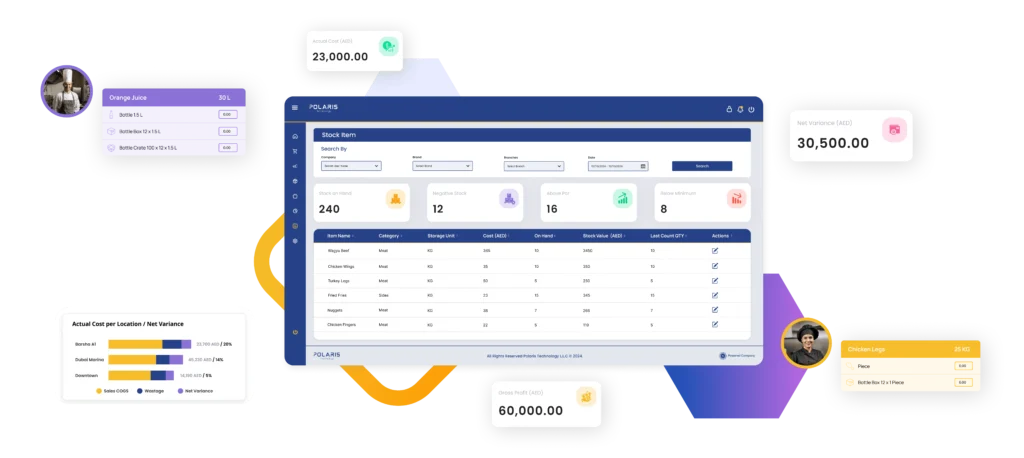
Employee Scheduling and Management:
Tools for scheduling shifts, tracking employee performance, and managing payroll to optimize workforce efficiency are indispensable to restaurant managers. In addition to this, an advanced restaurant software, such as a restaurant ERP, also includes employee upselling program, a feature that is increasingly popular among restaurateurs, as it helps boosting revenue.
Suppliers’ goods and services often go through price fluctuations. In large organizations tracking these fluctuations without an ERP system like Polaris ERP is a complex task, and not always timely. A restaurant ERP includes purchase management system, which allows the ability to manage relationships with suppliers, track deliveries, and ensure a steady supply chain for ingredients and goods.
At the heart of an ERP system stays the accounting software, capturing data from across all data points: POS, purchase, staff and other expenses. Polaris ERP provides seamless integration with financial modules for accurate accounting, expense tracking, and financial reporting.
When choosing a restaurant ERP software for your F&B business, you need to make sure that the software is made for restaurants, customized to all operations within this industry, such as, but not limited to: consolidation with POS; direct connection with purchase; payroll and other admin expenses feed in to the accounting system. Moreover, the accounting system for restaurants needs to have the capacity to provide instant reports detailing your revenue, expenses, cash flow and profits, so you always know how your F&B business is performing.
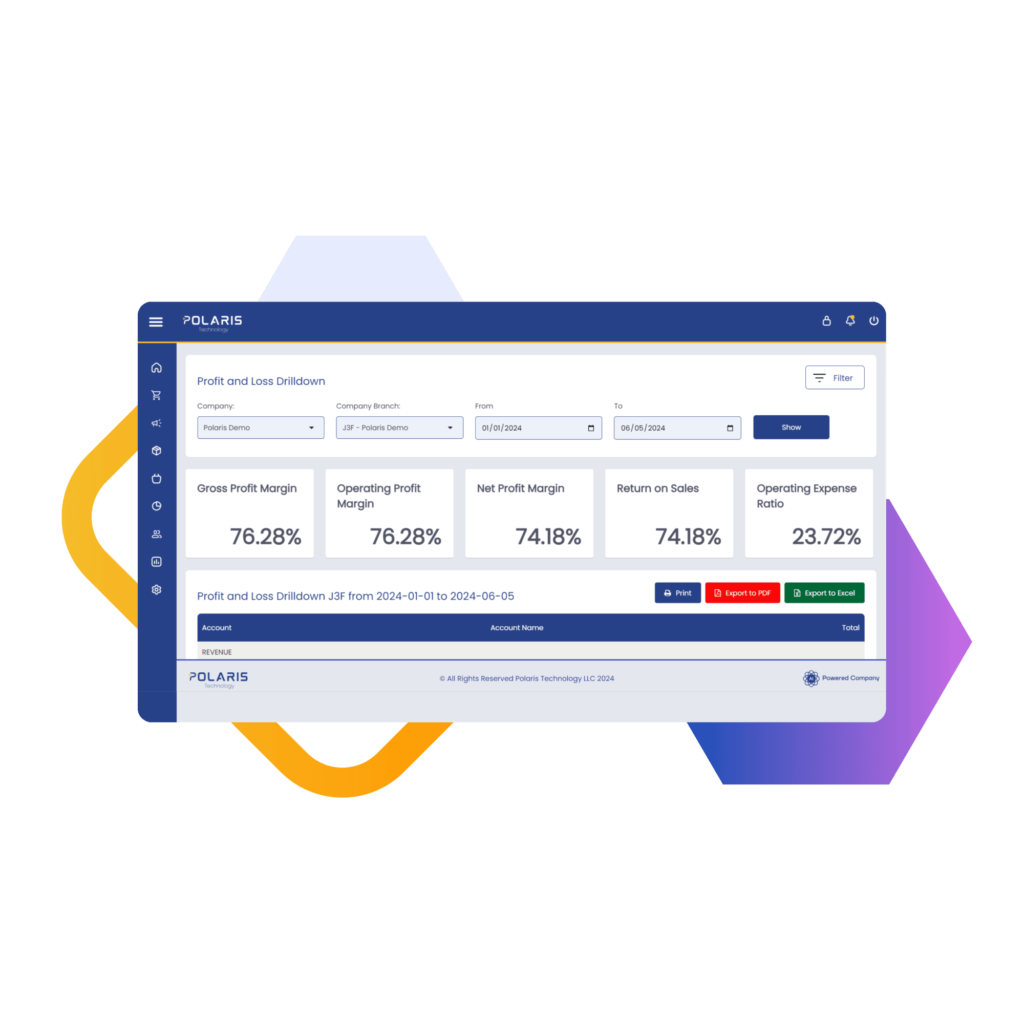
The best restaurant ERP software for your F&B business needs to be able to display real time data about how your business is doing. This include having a quick overview over the main numbers that you must master to be able to grow your business: revenue, expenses, profit, and cash flow. Furthermore, a complex analytical system needs to access all the data within your business, and be able to tell you the story of where your business is heading.
The flexibility to scale operations easily, accommodating multiple locations, expanded menus, and increased transaction volumes is well supported by a restaurant ERP. Unlike other software on the market, an F&B business cannot outgrow a restaurant ERP. Like this, if a business will grow from one to 10 branches or more, an ERP system will be fitted to provide data from across all branches and locations of the business, whereas other software don’t have this ability, and need a lot of manual processing.
Mobile Accessibility:
Considering that restaurateurs are always on the move, an ERP system for restaurants needs to be mobile friendly, and accessible from mobile devices, enabling restaurant managers to monitor and manage operations remotely.
Customer Relationship Management (CRM):
The integration with CRM functionalities is required in order to track customer interactions, preferences, and feedback, enhancing customer relationship management.
User-Friendly Interface:
An intuitive and user-friendly interface that facilitates easy adoption and usage by restaurant staff with varying technical expertise is crucial when selecting the best restaurant ERP for your F&B business. Sometimes the complexity of the design might be a reason for not adopting the specific solution, therefore an ERP solution for restaurants need to be easy to use, and adapted to the F&B industry and terminology.
AI-Powered Restaurant Consultant:
This is an advanced feature that brings significant benefits to restaurant owners and managers. It implies that the ERP software integrates artificial intelligence that has the potential to provide data-driven recommendations, by analyzing the unique insights within your F&B business. This technology offers intelligent consulting solutions, providing instant business advice, menu engineering optimization, or food cost calculation and recipe management, customized on your restaurant’s financial insights.

While several ERP software solutions are designed to address individual F&B needs, such as POS, inventory, or accounting, few offer all the features mentioned above or fully meet the needs of restaurant managers and owners. In fact, the only ERP software specifically developed to cover all F&B operations is Polaris ERP – an AI-powered unified platform that meets restaurant owners’ needs for efficiency, cost savings, and profit maximization.
Ali Payandenick, CEO of Polaris Technology
With over 1,000 F&B businesses in their portfolio, Polaris Technology is helping restaurant managers and owners in the UAE, Saudi Arabia, and other Gulf countries increase their profits, reduce costs, and optimize their operations. Polaris Technology is the best-in-class when it comes to data-driven decision making. With its AI-powered assistant, restaurant managers only need to address the strategic questions regarding their business needs and goals, to which the intelligent system will provide instant solutions, incorporating data from all across the system, including stocks and inventory management, suppliers, menu management, and so much more.
When using Polaris ERP, all systems are natively connected: POS, inventory (including menu engineering, food cost calculator, waste management), purchase (including suppliers and price fluctuation alerts), accounting, human resources, and more. This all-in-one restaurant ERP software provides real-time date so F&B pros can always know how their business is doing and what they need to improve. Everything is automated, cloud-based, and customizable to different restaurants’ needs.
Remember, when choosing the right restaurant ERP for your F&B business, not all software on the market are suitable for the restaurant industry. You need to make sure that the ERP will help you reach your goals, answer your business’ and managerial needs, and most importantly, that it will make your life easier, streamlining your business and consolidating success in delivering excellent customer service.
To find out more about Polaris Technology’s restaurant management ERP solution, visit https://polariserp.com/ and if you’re interested in seeing a demo, email us at info@polariserp.com.
You may also be interested in:
Book a free demo
15 Comments
Comments are closed.

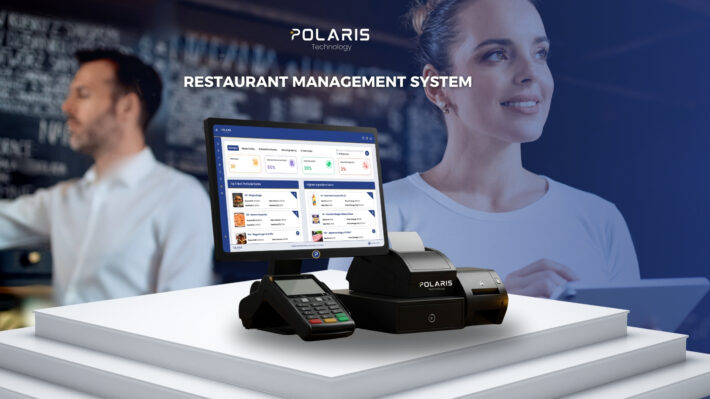

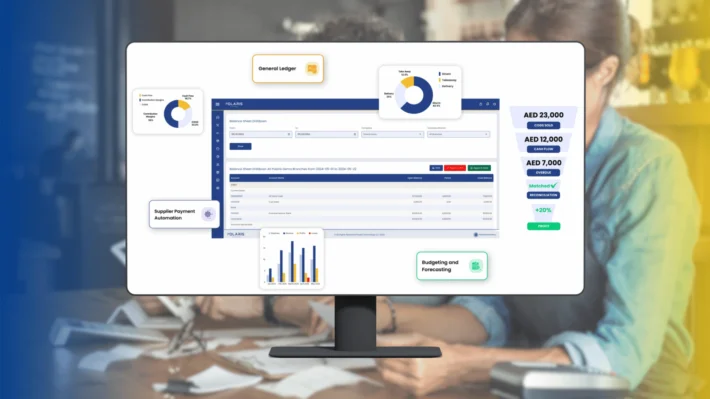
[…] Learn How to Choose the Best ERP for Your Restaurant in 2024 […]
[…] Kelly’s Cajun Grill The Desi Mojo The Best Restaurant ERP in 2024 […]
[…] Restaurant Accounting Software Menu Engineering Best Restaurant ERP […]
[…] How to choose the best ERP system for your F&B business? […]
[…] Restaurant Accounting Software 2024 The Best Restaurant ERP in 2024 […]
[…] list of restaurant ERP software is a noteworthy accomplishment. It illustrates how well a product streamlines restaurant operations, among other significant […]
[…] How to Choose the Best ERP for Your Restaurant […]
[…] can a restaurant ERP system enhance the use of contactless technology in […]
[…] Key features of an ERP system designed for the restaurant industry. […]
[…] How to Choose the Best Restaurant ERP Software […]
[…] are the benefits of using a restaurant ERP in […]
[…] How to choose the best restaurant ERP software? […]
[…] Improve Restaurant Operational Performance […]
[…] how a Restaurant ERP helps you scale […]
[…] Learn how to choose the best Restaurant ERP in 2025 […]